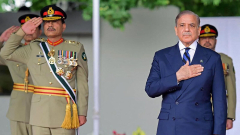Pakistan Army Chief general Syed Asim Munir, who for so long was speculated to be ‘hiding’, stood resolute atop a tank and declared, “Let there be no ambiguity. Any military misadventure by India will be met with a swift, resolute and notch-up response.”
The declaration came on Thursday, weeks after the Pahalgam terror attack soured an already fragile relation between India and Pakistan.
Munir labeling Kashmir as ‘jugular vein’, was indicative of a deeply woven Pakistani cultural narrative and vocabulary, signifying how Pakistan sees Kashmir as vital to its national identity. In the same speech, General Munir said, “We will not leave our Kashmiri brethren in their heroic struggle that they are waging against Indian occupation.”
On April 26, Asim Munir addressed cadets at a graduation ceremony for the country’s premier military academy. He invoked the “two-nation theory” — the framework behind Pakistan’s founding in 1947, which asserts that Hindus and Muslims are separate nations needing separate homelands.
Pakistani authorities have firmly denied any association between General Munir’s statements and the recent attack in Kashmir.
Asim Iftikhar Ahmad, Pakistan’s permanent envoy to the United Nations, dismissed India’s accusations of Pakistani involvement, emphasising that the fundamental cause of unrest in South Asia remains the longstanding unresolved issue of Kashmir.
For his part, General Munir has spoken since the Pahalgam terror attack in explicitly ideological terms that indicate he is disinclined to believe that long-term peace with India is possible.
After attacks on Indian security forces in Kashmir in 2016 and 2019, India responded by striking what it said were terrorist camps inside Pakistan.
Two-Nation Theory and Kashmir
The two-nation theory has long shaped Pakistan’s national identity and foreign policy, with Islamabad military leaders historically emphasising it during periods of tension with India and softening their stance when diplomacy was possible.
Since the partition of British India in 1947, Kashmir has remained the epicentre of the India-Pa





